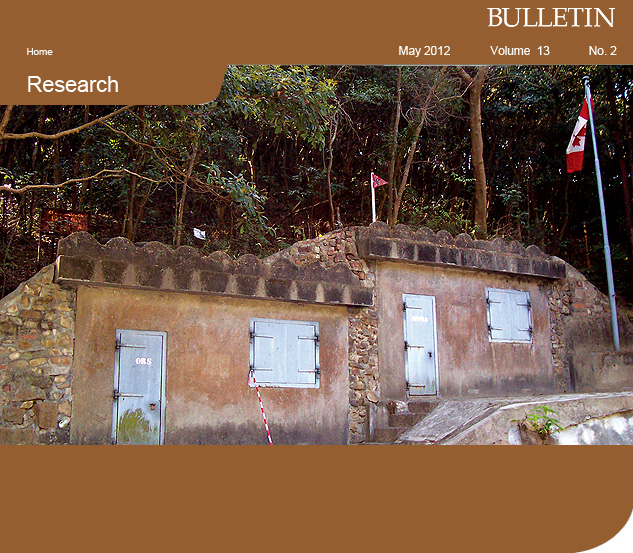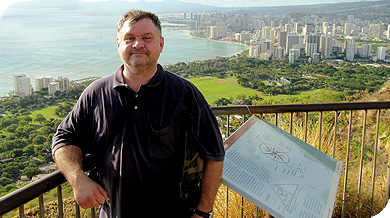| Hong Kong’s Pivotal Role in the Pacific War | |
| Hong Kong helped to supply the anti-Japanese forces in China and also acted as a lure to keep Japan from attacking Russia. |

|
 | “My work puts Hong Kong back where it belongs in World War II and that’s in China, as opposed to being an imperial colonial outpost. It’s a significant Chinese city in World War II.” |
|||
| Dr David Macri | ||||
On December 8, 1941, Hong Kong was invaded by Japan. The city was not the international financial centre that it is today, nor was it the only Asian city occupied by an Allied power. So why Hong Kong? And why, three weeks before the invasion, was a troop of Canadian soldiers sent to defend the place? These questions are at the heart of research by Dr David Macri, who was named an Outstanding Research Postgraduate Student by HKU for his work. He has shown that contrary to military history books, Hong Kong was not a sleepy colonial backwater, but in fact played an important role in military terms. Firstly, it was a major supplier to the anti-Japanese resistance. “The Hong Kong port was free from Japanese occupation for four years and it was connected by rail to the middle of China, which made it a great route to bring in military supplies,” Dr Macri says. “Basically Hong Kong sustained the Chinese army for four years. You talk of the Burma road, but the route from Hong Kong was more important in tonnage terms. Without Hong Kong, China wouldn’t have been able to fight for as long as they did.” Keeping the Japanese occupied This was of particular interest to the Allies, especially US President Franklin Roosevelt, who wanted to keep the Chinese fighting so they could tie up the Japanese. While that worked for several years, the clock began ticking when Germany invaded Russia in June 1941. The Red Army was weakened and the Japanese were thinking of invading the country from the East. “That would have been the end of the war,” Dr Macri says, not in the Allies favour. Japan also had an eye on Asia, especially Indonesia’s oil reserves, so the Allies played on this to divert them away from Russia. “Basically they baited them to come south,” he says. “The Japanese could see a build-up in Singapore, the Philippines, they’re worried about US naval forces in the Pacific. They could see time was running out. Then the Canadian troops came into Hong Kong and they had to act or concede to American pressure and withdraw from China.” The presence of the Canadians had been orchestrated by Roosevelt. American troops could not be sent because the country was neutral at the time, so he courted Canadian Prime Minister Mackenzie King, who sent a group of young and inexperienced soldiers to the territory. A Chinese city versus a British imperial outpost The Japanese responded by simultaneously bombing Pearl Harbour and invading Hong Kong in December 1941. The city fell after three weeks, but the goal of diverting the Japanese had been achieved. “My work puts Hong Kong back where it belongs in World War II and that’s in China, as opposed to being an imperial colonial outpost. It’s a significant Chinese city in World War II,” Dr Macri says. This fresh interpretation of Hong Kong’s role was possible because Dr Macri could uniquely combine two important elements: an understanding of the situation in Canada at the time, and of Hong Kong and China. As a Canadian, he was aware of the sensitivities of sending soldiers to defend a remote British colony because of resistance from the country’s French-speaking population – in fact, this was one of the reasons he began to explore the involvement in Hong Kong. Putting the pieces together at HKU Coming to HKU to do his doctorate enabled him to get a better understanding of the region. “The biggest help was beefing up my knowledge of Chinese history which I was lacking,” he says. “If I hadn’t been in Hong Kong, I wouldn’t have developed the thesis that I did. People who don’t know about Hong Kong write about it in terms of the British empire. I would have fallen into the same trap. But being in Hong Kong you can see that doesn’t make much sense. I was able to put both sides together.” A book based on his research, Clash of Empires in South China: The Allied Nation’s Proxy War with Japan, 1935–1941, will be published later this year by the University Press of Kansas, one of the world’s top publishers of military history. Meanwhile, Dr Macri is now working with the Joint PoW/MIA Accounting Command of the US Army in Hawaii to help track down the remains of US military personnel who are still missing in Asia.
|
| Back | Next |